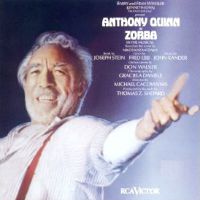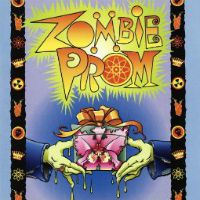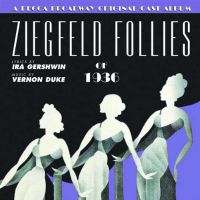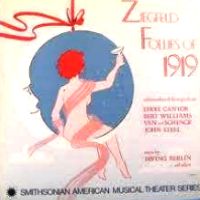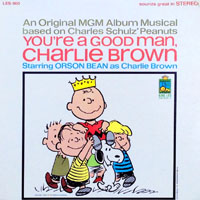 Studio Cast, 1966 (MGM/no CD)
Studio Cast, 1966 (MGM/no CD)  (3 / 5) Long out of print, this recording was one of the first musical theater “concept albums.” Few people seem to be aware that You’re a Good Man, Charlie Brown began not as an Off-Broadway show but as a recording of 10 songs by composer-lyricist Clark Gesner, inspired by Charles Schultz’s extraordinarily popular “Peanuts” comic strip. Very difficult to track down, the LP is noteworthy for several reasons aside from its historical value as the basis for one of the most successful Off-Broadway musicals ever. The four-member cast — Orson Bean as Charlie Brown, Barbara Minkus as Lucy, Bill Hinnant as Snoopy, and Gesner himself as Linus — is excellent. Although Bean is probably best remembered as a television host and game show panelist, he was a fine actor, and his Charlie Brown is endearing even if Bean never really creates the impression of being a child. Minkus, on the other hand, does have a “little girl” voice that she puts to excellent use in Lucy’s numbers, especially “Schroeder” and “The Doctor Is In.” Gesner is charming in his one solo spot, Linus’s “My Blanket and Me.” And Hinnant is thoroughly delightful as Snoopy, a role he owned for quite some time (see below). This is the only recording of YAGMCB to boast a full orchestra, led by legendary conductor Jay Blackton. Those trumpets in the title song and those strings in “Snoopy” really add something to the music. — Michael Portantiere
(3 / 5) Long out of print, this recording was one of the first musical theater “concept albums.” Few people seem to be aware that You’re a Good Man, Charlie Brown began not as an Off-Broadway show but as a recording of 10 songs by composer-lyricist Clark Gesner, inspired by Charles Schultz’s extraordinarily popular “Peanuts” comic strip. Very difficult to track down, the LP is noteworthy for several reasons aside from its historical value as the basis for one of the most successful Off-Broadway musicals ever. The four-member cast — Orson Bean as Charlie Brown, Barbara Minkus as Lucy, Bill Hinnant as Snoopy, and Gesner himself as Linus — is excellent. Although Bean is probably best remembered as a television host and game show panelist, he was a fine actor, and his Charlie Brown is endearing even if Bean never really creates the impression of being a child. Minkus, on the other hand, does have a “little girl” voice that she puts to excellent use in Lucy’s numbers, especially “Schroeder” and “The Doctor Is In.” Gesner is charming in his one solo spot, Linus’s “My Blanket and Me.” And Hinnant is thoroughly delightful as Snoopy, a role he owned for quite some time (see below). This is the only recording of YAGMCB to boast a full orchestra, led by legendary conductor Jay Blackton. Those trumpets in the title song and those strings in “Snoopy” really add something to the music. — Michael Portantiere
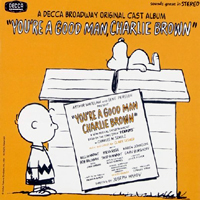 Original Off-Broadway Cast, 1967 (MGM/Decca)
Original Off-Broadway Cast, 1967 (MGM/Decca)  (4 / 5) This recording is recommended primarily for the definitive performances of its cast. Gary Burghoff, later famous as Radar O’Reilly in the long-running television series M*A*S*H , is perfect as Charlie Brown. It’s a difficult assignment in that the character has to seem hapless and “wishy-washy,” as everyone (including himself) thinks he is, yet he must be appealing and sympathetic to the audience in an Everyman sort of way. Burghoff walks that line beautifully, and is persuasive in all of Charlie’s vocal moments. Reva Rose is equally great in the role of Lucy; her semi-screaming of the high notes in “The Doctor Is In” (a.k.a. “Dr. Lucy”) is priceless, and she’s a stitch when giving tons of wrong information to brother Linus in “Little Known Facts.” Bob Balaban is an adorable Linus, and Bill Hinnant is even better as Snoopy here than he is on the concept album; he’s also given more to do, thanks to the addition of the “Red Baron” scene and other juicy sections of dialogue taken directly from the “Peanuts” strip. Karen Johnson has virtually no solo moments in the role of Patty, and Skip Hinnant (Bill’s brother) has only slightly more to do as Schroeder. There were a few significant additions to the score for the show’s stage debut as compared to what’s heard on the original recording; among them are Charlie Brown’s extended solo in “T.E.A.M.” and “Book Report,” a clever ensemble number in which Charlie, Lucy, Linus and Schroeder each take different approaches to the same homework assignment. The title song has also been expanded considerably. The score’s instrumentation here is limited to piano and percussion, but the sound quality of the recording is exceptionally good, and there’s a palpable theatricality about it. Decca Broadway’s CD reissue of the album has four bonus tracks of demos performed by Gesner and Barbara Minkus, with Gesner at the piano. — M.P.
(4 / 5) This recording is recommended primarily for the definitive performances of its cast. Gary Burghoff, later famous as Radar O’Reilly in the long-running television series M*A*S*H , is perfect as Charlie Brown. It’s a difficult assignment in that the character has to seem hapless and “wishy-washy,” as everyone (including himself) thinks he is, yet he must be appealing and sympathetic to the audience in an Everyman sort of way. Burghoff walks that line beautifully, and is persuasive in all of Charlie’s vocal moments. Reva Rose is equally great in the role of Lucy; her semi-screaming of the high notes in “The Doctor Is In” (a.k.a. “Dr. Lucy”) is priceless, and she’s a stitch when giving tons of wrong information to brother Linus in “Little Known Facts.” Bob Balaban is an adorable Linus, and Bill Hinnant is even better as Snoopy here than he is on the concept album; he’s also given more to do, thanks to the addition of the “Red Baron” scene and other juicy sections of dialogue taken directly from the “Peanuts” strip. Karen Johnson has virtually no solo moments in the role of Patty, and Skip Hinnant (Bill’s brother) has only slightly more to do as Schroeder. There were a few significant additions to the score for the show’s stage debut as compared to what’s heard on the original recording; among them are Charlie Brown’s extended solo in “T.E.A.M.” and “Book Report,” a clever ensemble number in which Charlie, Lucy, Linus and Schroeder each take different approaches to the same homework assignment. The title song has also been expanded considerably. The score’s instrumentation here is limited to piano and percussion, but the sound quality of the recording is exceptionally good, and there’s a palpable theatricality about it. Decca Broadway’s CD reissue of the album has four bonus tracks of demos performed by Gesner and Barbara Minkus, with Gesner at the piano. — M.P.
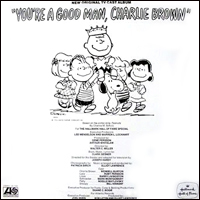 TV Cast, 1973 (Atlantic/no CD)
TV Cast, 1973 (Atlantic/no CD)  (3 / 5) Also out of print for decades, this cast album of a 1973 “Hallmark Hall of Fame” TV production of You’re a Good Man, Charlie Brown is quite enjoyable in that the company is generally strong and the score is more fully orchestrated than on the Off-Broadway recording (though less fully orchestrated than on the concept recording). The performers include Wendell Burton, who had played Charlie Brown on stage in San Francisco; Bill Hinnant, again outstanding as Snoopy; and Barry Livingston, of My Three Sons TV fame, as an appealing Linus. In the role of Lucy, Ruby Persson gives a creditable performance, far better than one would expect after noticing that she has the same last name as one of the show’s producers. Rounding out the cast are Mark Montgomery as a charming Schroeder and Noelle Matlovsky in the thankless role of Patty. If you have a working turntable hooked up to your sound system at home, a vinyl LP copy of this album is worth seeking out as more than a curiosity. — M.P.
(3 / 5) Also out of print for decades, this cast album of a 1973 “Hallmark Hall of Fame” TV production of You’re a Good Man, Charlie Brown is quite enjoyable in that the company is generally strong and the score is more fully orchestrated than on the Off-Broadway recording (though less fully orchestrated than on the concept recording). The performers include Wendell Burton, who had played Charlie Brown on stage in San Francisco; Bill Hinnant, again outstanding as Snoopy; and Barry Livingston, of My Three Sons TV fame, as an appealing Linus. In the role of Lucy, Ruby Persson gives a creditable performance, far better than one would expect after noticing that she has the same last name as one of the show’s producers. Rounding out the cast are Mark Montgomery as a charming Schroeder and Noelle Matlovsky in the thankless role of Patty. If you have a working turntable hooked up to your sound system at home, a vinyl LP copy of this album is worth seeking out as more than a curiosity. — M.P.
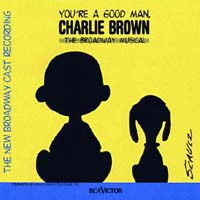 Broadway Cast, 1999 (RCA)
Broadway Cast, 1999 (RCA)  (2 / 5) When the original production of You’re a Good Man Charlie Brown transferred to Broadway after a downtown, Off-Broadway run of more than 1500 performances, it closed within a month. But the musical received countless amateur and regional productions over the years, and it may have been a fear of over-familarity that prompted the producers of the ’99 Broadway version to have composer-lyricist Andrew Lippa revise and augment the original score. Aside from aggressively rearranging Clark Gesner’s music, Lippa contributed a catchy new section of the title song, but the two new numbers he wrote from scratch are highly questionable additions: Schroeder’s “Beethoven Day” is a joyously rhythmic pop tune, the problem here being that this fussy, “serious-musician” type would never express himself in such a way; and though Kristin Chenoweth, in the newly created role of Sally Brown, somehow manages to mine comic gold from “My New Philosophy,” the song itself really isn’t that funny. There’s fine work from Anthony Rapp as Charlie Brown, Ilana Levine as Lucy, B.D. Wong as a lisping Linus, and Roger Bart in a winning turn as Snoopy. Stanley Wayne Mathis does a good job with “Beethoven Day,” but he’s as miscast in the role of Schroeder as the song is wrong for the character. The practically superfluous role of Patty was eliminated for this production and replaced by Sally, who became an integral part of the show, largely due to Chenoweth’s Tony Award-winning portrayal. — M.P.
(2 / 5) When the original production of You’re a Good Man Charlie Brown transferred to Broadway after a downtown, Off-Broadway run of more than 1500 performances, it closed within a month. But the musical received countless amateur and regional productions over the years, and it may have been a fear of over-familarity that prompted the producers of the ’99 Broadway version to have composer-lyricist Andrew Lippa revise and augment the original score. Aside from aggressively rearranging Clark Gesner’s music, Lippa contributed a catchy new section of the title song, but the two new numbers he wrote from scratch are highly questionable additions: Schroeder’s “Beethoven Day” is a joyously rhythmic pop tune, the problem here being that this fussy, “serious-musician” type would never express himself in such a way; and though Kristin Chenoweth, in the newly created role of Sally Brown, somehow manages to mine comic gold from “My New Philosophy,” the song itself really isn’t that funny. There’s fine work from Anthony Rapp as Charlie Brown, Ilana Levine as Lucy, B.D. Wong as a lisping Linus, and Roger Bart in a winning turn as Snoopy. Stanley Wayne Mathis does a good job with “Beethoven Day,” but he’s as miscast in the role of Schroeder as the song is wrong for the character. The practically superfluous role of Patty was eliminated for this production and replaced by Sally, who became an integral part of the show, largely due to Chenoweth’s Tony Award-winning portrayal. — M.P.
 Off-Broadway Cast, 2016 (Broadway Records)
Off-Broadway Cast, 2016 (Broadway Records)  (1 / 5) There exists a recording of the Humperdinck opera Hänsel und Gretel with with actual children singing the title roles, which were intended by the composer to be sung by an adult mezzo soprano and soprano (respectively). Although that may sound like a good idea in theory from the standpoint of verisimilitude, in practice it doesn’t work, because the demands of the music are beyond the abilities of pre-pubescent voices. Needless to say, if the composer had wanted these roles to be sung by children, he would have written them very differently. A similar situation exists with this cast album of the 2016 York Theatre Company production of You’re a Good Man, Charlie Brown, which featured performers ranging in age from 9 to 14 and retained the unnecessary, mostly unfortunate Andrew Lippa revisions/additions to the score. Although this show is far from operatic in style, it still requires a vocal maturity that these youngsters obviously don’t possess. The kids also generally fall short in terms of musical phrasing, comic timing, and persuasive delivery of the fair amount of spoken dialogue included on the recording; it often sounds as if their inflections were grafted onto them by the director, rather than being organic. All of that makes this the least satisfying recording of the score. Interestingly, the opening number here interpolates a couple of measures of the cool jazz trio music that Vince Guaraldi composed for the classic 1960s TV special A Charlie Brown Christmas. Justly famous and beloved as this riff is, it doesn’t fit with the original Clark Gesner songs any better than does the Lippa material. One wonders if rights had to be obtained to use it, and at what price! — M.P.
(1 / 5) There exists a recording of the Humperdinck opera Hänsel und Gretel with with actual children singing the title roles, which were intended by the composer to be sung by an adult mezzo soprano and soprano (respectively). Although that may sound like a good idea in theory from the standpoint of verisimilitude, in practice it doesn’t work, because the demands of the music are beyond the abilities of pre-pubescent voices. Needless to say, if the composer had wanted these roles to be sung by children, he would have written them very differently. A similar situation exists with this cast album of the 2016 York Theatre Company production of You’re a Good Man, Charlie Brown, which featured performers ranging in age from 9 to 14 and retained the unnecessary, mostly unfortunate Andrew Lippa revisions/additions to the score. Although this show is far from operatic in style, it still requires a vocal maturity that these youngsters obviously don’t possess. The kids also generally fall short in terms of musical phrasing, comic timing, and persuasive delivery of the fair amount of spoken dialogue included on the recording; it often sounds as if their inflections were grafted onto them by the director, rather than being organic. All of that makes this the least satisfying recording of the score. Interestingly, the opening number here interpolates a couple of measures of the cool jazz trio music that Vince Guaraldi composed for the classic 1960s TV special A Charlie Brown Christmas. Justly famous and beloved as this riff is, it doesn’t fit with the original Clark Gesner songs any better than does the Lippa material. One wonders if rights had to be obtained to use it, and at what price! — M.P.
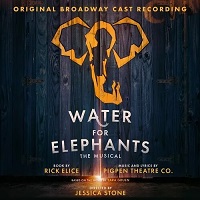 Original Broadway Cast, 2024 (Ghostlight)
Original Broadway Cast, 2024 (Ghostlight)  (2.5 / 5) Under the direction of Jessica Stone, Water for Elephants boasted an inventive set and a variety of entertaining circus acts on stage at the Imperial Theatre. The dazzling visuals were supported by music and lyrics from the seven-member band PigPen Theatre Co., which specializes in folk music, and this score leans heavily into that genre. The show’s book, written by Rick Elice, adheres closely to the 2006 novel of the same title by Sara Gruen. It presents a love triangle between the three main characters, and also largely concerns an elephant named Rosie, who can be heard briefly on the recording as well. The central character is Jacob Jankowski, played as an older man by Broadway veteran Gregg Edelman, who has sadly been handed the score’s duller songs. He sets the story in motion by recalling his time as a grieving young man who hitched a ride on a train with the Benzini Brothers Circus. Young Jacob is played by Grant Gustin in a performance that comes across as serviceable; his delivery sounds melodramatic in both the opening number, “Anywhere,” and the second act ballad “Go Home.” Throughout the show, Jacob frequently finds himself at odds with August Rackinger, the slick but cruel and murderous ring-leader of the circus, a role sung to villainous perfection by Paul Alexander Nolan. Although the cast album starts out slow, it’s jolted into focus by Nolan’s charismatic introduction of the circus: “The Lion Has Got No Teeth.” The triangle is completed by August’s wife, Marlena, played by Isabelle McCalla. Her seductively charming voice is featured in the song “Easy,” as she and Jacob work to tame Rosie, the circus’s newest addition. Jacob and Marlena develop feelings for each other while training Rosie to perform, leading to the show’s best number, a thrilling duet titled “Wild.” Gustin, Nolan, and McCalla are all compelling as the score builds to its climax in the confrontational “You’ve Got Nothing,” which proves that PigPen Theatre Co. can not only write great folk songs, but great theatre songs as well. Some of the tracks featuring the circus troupe — for example, “The Road Don’t Make You Young” and “Another Train” — are genuine knee-slappers as they blend a folk sensibility with theatricality in a very satisfying way. On the negative side, the show’s lyrics in general exhibit an over-reliance on slant rhymes, and superfluous songs such as “Funny Angel,” “Zostań,” and “Squeaky Wheel” don’t serve to move the plot forward or help us understand the characters. — Forrest Hutchinson
(2.5 / 5) Under the direction of Jessica Stone, Water for Elephants boasted an inventive set and a variety of entertaining circus acts on stage at the Imperial Theatre. The dazzling visuals were supported by music and lyrics from the seven-member band PigPen Theatre Co., which specializes in folk music, and this score leans heavily into that genre. The show’s book, written by Rick Elice, adheres closely to the 2006 novel of the same title by Sara Gruen. It presents a love triangle between the three main characters, and also largely concerns an elephant named Rosie, who can be heard briefly on the recording as well. The central character is Jacob Jankowski, played as an older man by Broadway veteran Gregg Edelman, who has sadly been handed the score’s duller songs. He sets the story in motion by recalling his time as a grieving young man who hitched a ride on a train with the Benzini Brothers Circus. Young Jacob is played by Grant Gustin in a performance that comes across as serviceable; his delivery sounds melodramatic in both the opening number, “Anywhere,” and the second act ballad “Go Home.” Throughout the show, Jacob frequently finds himself at odds with August Rackinger, the slick but cruel and murderous ring-leader of the circus, a role sung to villainous perfection by Paul Alexander Nolan. Although the cast album starts out slow, it’s jolted into focus by Nolan’s charismatic introduction of the circus: “The Lion Has Got No Teeth.” The triangle is completed by August’s wife, Marlena, played by Isabelle McCalla. Her seductively charming voice is featured in the song “Easy,” as she and Jacob work to tame Rosie, the circus’s newest addition. Jacob and Marlena develop feelings for each other while training Rosie to perform, leading to the show’s best number, a thrilling duet titled “Wild.” Gustin, Nolan, and McCalla are all compelling as the score builds to its climax in the confrontational “You’ve Got Nothing,” which proves that PigPen Theatre Co. can not only write great folk songs, but great theatre songs as well. Some of the tracks featuring the circus troupe — for example, “The Road Don’t Make You Young” and “Another Train” — are genuine knee-slappers as they blend a folk sensibility with theatricality in a very satisfying way. On the negative side, the show’s lyrics in general exhibit an over-reliance on slant rhymes, and superfluous songs such as “Funny Angel,” “Zostań,” and “Squeaky Wheel” don’t serve to move the plot forward or help us understand the characters. — Forrest Hutchinson

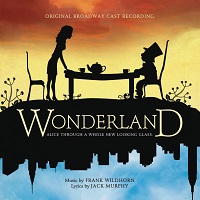
 (3 / 5) If you’re looking for an under-the-radar guilty pleasure album, you could do worse than Wonderland. It’s the silliest and least self-important of Frank Wildhorn’s scores, and the first act especially is a wacky delight. “We’re all a little nuts, in case you didn’t know,” the denizens of Wonderland tell an all-grown-up Alice (Janet Dacal) in this unconvincing twist on Lewis Carroll (please don’t listen for the plot), and the music is a little nuts, too. The Wonderland setting and the panoply of fantasy characters allow Wildhorn to pastiche any style he can think of: there’s a soulful caterpillar (E. Clayton Cornelious), a pop salsa-dancing Cheshire Cat called El Gato (Jose Llana), and a boy band-fronting White Knight (Darren Ritchie). Their trio of songs, which come back-to-back-to-back early on the album, are well-made, playful, and fun. Dacal, whose Alice communicates exclusively through a pop belt dialed up to 11, is always an appealing vocal presence, especially in the aggressively catchy “Through the Looking Glass.” They’re all overshadowed, though, by the extraordinary Kate Shindle (before her election to the presidency of Actors’ Equity) as an electrifyingly villainous Mad Hatter who screlts to bring the chandelier down. The versatile orchestrations, by Wildhorn’s frequent collaborator Kim Scharnberg, are a hoot. Alas, the second act is an unoriginal slog until the finale, “Finding Wonderland,” which recalls The Wiz’s “Home” (as opposed to this show’s sweet opening number, also called “Home”) and showcases Dacal’s substantial gifts. — Dan Rubins
(3 / 5) If you’re looking for an under-the-radar guilty pleasure album, you could do worse than Wonderland. It’s the silliest and least self-important of Frank Wildhorn’s scores, and the first act especially is a wacky delight. “We’re all a little nuts, in case you didn’t know,” the denizens of Wonderland tell an all-grown-up Alice (Janet Dacal) in this unconvincing twist on Lewis Carroll (please don’t listen for the plot), and the music is a little nuts, too. The Wonderland setting and the panoply of fantasy characters allow Wildhorn to pastiche any style he can think of: there’s a soulful caterpillar (E. Clayton Cornelious), a pop salsa-dancing Cheshire Cat called El Gato (Jose Llana), and a boy band-fronting White Knight (Darren Ritchie). Their trio of songs, which come back-to-back-to-back early on the album, are well-made, playful, and fun. Dacal, whose Alice communicates exclusively through a pop belt dialed up to 11, is always an appealing vocal presence, especially in the aggressively catchy “Through the Looking Glass.” They’re all overshadowed, though, by the extraordinary Kate Shindle (before her election to the presidency of Actors’ Equity) as an electrifyingly villainous Mad Hatter who screlts to bring the chandelier down. The versatile orchestrations, by Wildhorn’s frequent collaborator Kim Scharnberg, are a hoot. Alas, the second act is an unoriginal slog until the finale, “Finding Wonderland,” which recalls The Wiz’s “Home” (as opposed to this show’s sweet opening number, also called “Home”) and showcases Dacal’s substantial gifts. — Dan Rubins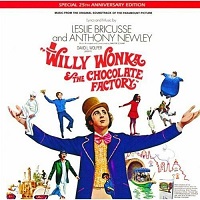
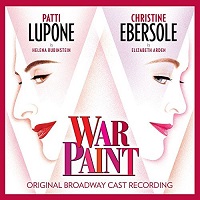
 (2 / 5) Based on the real-life rivalry between cosmetics titans Helena Rubinstein and Elizabeth Arden, with a score by Grey Gardens team Michael Korie and Scott Frankel, War Paint had the potential to be a great musical. Or, at least, with Broadway titans Patti LuPone and Christine Ebersole inhabiting the lead roles, it could have been a highly entertaining one. So it’s unfortunate that the final product played so tepidly on stage. While LuPone (Rubinstein) and Ebersole (Arden) were each in top form, the show never had its leading ladies share a scene together until the very end; instead, they would sing about each other rather than to each other from opposite sides of the stage. This robbed the show of any tension or drama, and it became a “she said/she said” play-by-play of the two women’s lives. On this recording, War Paint fares slightly better, with the stars giving commanding vocal performances, but the album also reinforces that the score is not on par with Grey Gardens. Though Frankel’s jazzy compositions are inventive and tuneful in period-appropriate orchestrations by Bruce Coughlin, several of the songs lack structure and/or don’t build to a satisfying musical conclusion. Korie’s lyrics, meanwhile, are lacking in subtlety or any deep insight regarding the principal characters, making such songs as “If I’d Been a Man” and “My Secret Weapon” much less effective than they might have been. Still, there are two strong 11 o’clock numbers in “Forever Beautiful” (Rubinstein) and “Pink” (Arden), each a reflection on the women’s legacies, which are now being taken away from them in the concluding years of their lives. When the two do get to sing together, as they do in “Face to Face” and “Beauty in the World,” LuPone and Ebersole’s voices blend in a surprisingly effective cohesion that briefly brings the score to a more musically dramatic plain. Douglas Sills and John Dossett also appear as the two men behind the women, but their talents are wasted on the two worst songs in the score, “Step on Out” and “Dinosaurs.” In War Paint, it’s clear that LuPone and Ebersole are meant to be the ones who rule — and they do. But with stronger material, they could’ve really shone. — Matt Koplik
(2 / 5) Based on the real-life rivalry between cosmetics titans Helena Rubinstein and Elizabeth Arden, with a score by Grey Gardens team Michael Korie and Scott Frankel, War Paint had the potential to be a great musical. Or, at least, with Broadway titans Patti LuPone and Christine Ebersole inhabiting the lead roles, it could have been a highly entertaining one. So it’s unfortunate that the final product played so tepidly on stage. While LuPone (Rubinstein) and Ebersole (Arden) were each in top form, the show never had its leading ladies share a scene together until the very end; instead, they would sing about each other rather than to each other from opposite sides of the stage. This robbed the show of any tension or drama, and it became a “she said/she said” play-by-play of the two women’s lives. On this recording, War Paint fares slightly better, with the stars giving commanding vocal performances, but the album also reinforces that the score is not on par with Grey Gardens. Though Frankel’s jazzy compositions are inventive and tuneful in period-appropriate orchestrations by Bruce Coughlin, several of the songs lack structure and/or don’t build to a satisfying musical conclusion. Korie’s lyrics, meanwhile, are lacking in subtlety or any deep insight regarding the principal characters, making such songs as “If I’d Been a Man” and “My Secret Weapon” much less effective than they might have been. Still, there are two strong 11 o’clock numbers in “Forever Beautiful” (Rubinstein) and “Pink” (Arden), each a reflection on the women’s legacies, which are now being taken away from them in the concluding years of their lives. When the two do get to sing together, as they do in “Face to Face” and “Beauty in the World,” LuPone and Ebersole’s voices blend in a surprisingly effective cohesion that briefly brings the score to a more musically dramatic plain. Douglas Sills and John Dossett also appear as the two men behind the women, but their talents are wasted on the two worst songs in the score, “Step on Out” and “Dinosaurs.” In War Paint, it’s clear that LuPone and Ebersole are meant to be the ones who rule — and they do. But with stronger material, they could’ve really shone. — Matt Koplik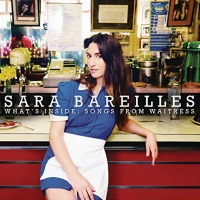
 (4 / 5) The idea of Sara Bareilles writing a musical wasn’t so far-out, even before it happened. The 21st century has seen several musical theater scores written by popular singer/songwriters (Kinky Boots, The Last Ship, 9 to 5), and with her insightful lyrics and inventive, pop/soul colored music, Bareilles seemed a natural fit for the modern musical stage. But, gifted as many of these writers are, few have been able to successfully translate their talent to Broadway, so it’s refreshing that Bareilles has done as well as she has in this respect. What’s Inside is not a cast recording, but more of a concept album that previews Bareilles’ score for Waitress — a musical based on the 2007 film of the same title, about a diner waitress and pie maker extraordinaire named Jenna who’s trying to escape an unhappy marriage, only to discover that she’s pregnant. Though the plot is a bit of a downer, the film used dry humor and charming performances to create more of a grounded, intimate comedy. Bareilles’ songs match the tone of the film and dig deep into the characters, from the deceptively peppy “Opening Up” to the ethereal, dreamlike “Soft Place to Land” to the heartbreaking “She Used to Be Mine.” All of the tracks on this album are sung by Bareilles (with guest vocals by Jason Mraz), and it’s charming to hear her shift from Jenna to other characters throughout. What’s Inside: Songs from Waitress is both a fun showcase for her as a singer/songwriter and a great introduction to her first musical. — Matt Koplik
(4 / 5) The idea of Sara Bareilles writing a musical wasn’t so far-out, even before it happened. The 21st century has seen several musical theater scores written by popular singer/songwriters (Kinky Boots, The Last Ship, 9 to 5), and with her insightful lyrics and inventive, pop/soul colored music, Bareilles seemed a natural fit for the modern musical stage. But, gifted as many of these writers are, few have been able to successfully translate their talent to Broadway, so it’s refreshing that Bareilles has done as well as she has in this respect. What’s Inside is not a cast recording, but more of a concept album that previews Bareilles’ score for Waitress — a musical based on the 2007 film of the same title, about a diner waitress and pie maker extraordinaire named Jenna who’s trying to escape an unhappy marriage, only to discover that she’s pregnant. Though the plot is a bit of a downer, the film used dry humor and charming performances to create more of a grounded, intimate comedy. Bareilles’ songs match the tone of the film and dig deep into the characters, from the deceptively peppy “Opening Up” to the ethereal, dreamlike “Soft Place to Land” to the heartbreaking “She Used to Be Mine.” All of the tracks on this album are sung by Bareilles (with guest vocals by Jason Mraz), and it’s charming to hear her shift from Jenna to other characters throughout. What’s Inside: Songs from Waitress is both a fun showcase for her as a singer/songwriter and a great introduction to her first musical. — Matt Koplik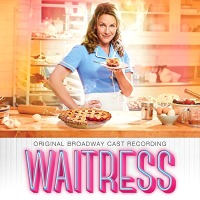



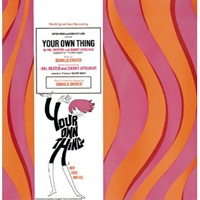





 (1 / 5) There exists a recording of the Humperdinck opera Hänsel und Gretel with with actual children singing the title roles, which were intended by the composer to be sung by an adult mezzo soprano and soprano (respectively). Although that may sound like a good idea in theory from the standpoint of verisimilitude, in practice it doesn’t work, because the demands of the music are beyond the abilities of pre-pubescent voices. Needless to say, if the composer had wanted these roles to be sung by children, he would have written them very differently. A similar situation exists with this cast album of the 2016 York Theatre Company production of You’re a Good Man, Charlie Brown, which featured performers ranging in age from 9 to 14 and retained the unnecessary, mostly unfortunate Andrew Lippa revisions/additions to the score. Although this show is far from operatic in style, it still requires a vocal maturity that these youngsters obviously don’t possess. The kids also generally fall short in terms of musical phrasing, comic timing, and persuasive delivery of the fair amount of spoken dialogue included on the recording; it often sounds as if their inflections were grafted onto them by the director, rather than being organic. All of that makes this the least satisfying recording of the score. Interestingly, the opening number here interpolates a couple of measures of the cool jazz trio music that Vince Guaraldi composed for the classic 1960s TV special A Charlie Brown Christmas. Justly famous and beloved as this riff is, it doesn’t fit with the original Clark Gesner songs any better than does the Lippa material. One wonders if rights had to be obtained to use it, and at what price! — M.P.
(1 / 5) There exists a recording of the Humperdinck opera Hänsel und Gretel with with actual children singing the title roles, which were intended by the composer to be sung by an adult mezzo soprano and soprano (respectively). Although that may sound like a good idea in theory from the standpoint of verisimilitude, in practice it doesn’t work, because the demands of the music are beyond the abilities of pre-pubescent voices. Needless to say, if the composer had wanted these roles to be sung by children, he would have written them very differently. A similar situation exists with this cast album of the 2016 York Theatre Company production of You’re a Good Man, Charlie Brown, which featured performers ranging in age from 9 to 14 and retained the unnecessary, mostly unfortunate Andrew Lippa revisions/additions to the score. Although this show is far from operatic in style, it still requires a vocal maturity that these youngsters obviously don’t possess. The kids also generally fall short in terms of musical phrasing, comic timing, and persuasive delivery of the fair amount of spoken dialogue included on the recording; it often sounds as if their inflections were grafted onto them by the director, rather than being organic. All of that makes this the least satisfying recording of the score. Interestingly, the opening number here interpolates a couple of measures of the cool jazz trio music that Vince Guaraldi composed for the classic 1960s TV special A Charlie Brown Christmas. Justly famous and beloved as this riff is, it doesn’t fit with the original Clark Gesner songs any better than does the Lippa material. One wonders if rights had to be obtained to use it, and at what price! — M.P.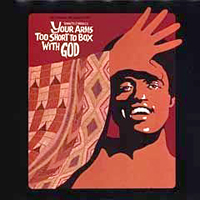
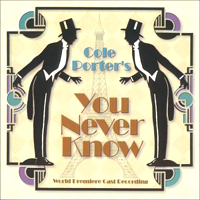
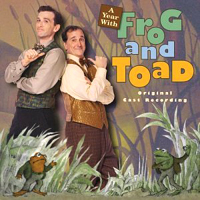

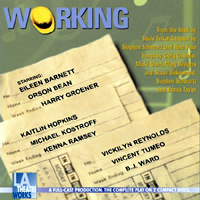
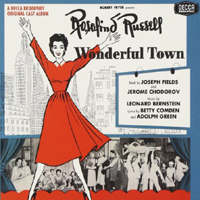

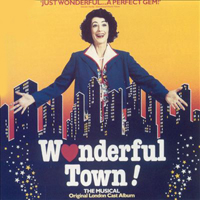


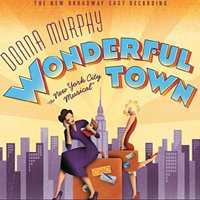
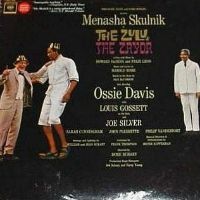
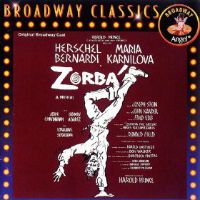
 (5 / 5) Are you sitting down? When I saw Zorba in its original Broadway production (not the horrible Anthony Quinn revival; see below), I thought it a better show than Cabaret, the previous Broadway outing of the team that put this show together: composer John Kander, lyricist Fred Ebb, and director Harold Prince. To me, Zorba is more emotional, deals with life more broadly, and is brilliantly theatrical. Whereas many Kander and Ebb musicals are made up of a succession of special-material songs, this one has an honest, mature, character- and plot-driven score. The opening number, “Life Is,” perfectly sets the theme of the evening. (The first line, “Life is what you do while you’re waiting to die,” was watered down to “Life is what you do till the moment you die” for later productions.) “Happy Birthday” is a wonderfully touching number for the death scene of Madame Hortense, while “Why Can’t I Speak” is a very beautiful song that exemplifies the protagonist Niko’s emotional problems. Although some of the events in Joseph Stein’s libretto are tragic, the audience leaves the theater moved, enlightened, even uplifted — and the cast album has the same effect on the listener. Herschel Bernardi, Maria Karnilova, John Cunningham, Carmen Alvarez, and Lorraine Serabian drive the recording with their sincerity, energy, and abundant talent. — Ken Bloom
(5 / 5) Are you sitting down? When I saw Zorba in its original Broadway production (not the horrible Anthony Quinn revival; see below), I thought it a better show than Cabaret, the previous Broadway outing of the team that put this show together: composer John Kander, lyricist Fred Ebb, and director Harold Prince. To me, Zorba is more emotional, deals with life more broadly, and is brilliantly theatrical. Whereas many Kander and Ebb musicals are made up of a succession of special-material songs, this one has an honest, mature, character- and plot-driven score. The opening number, “Life Is,” perfectly sets the theme of the evening. (The first line, “Life is what you do while you’re waiting to die,” was watered down to “Life is what you do till the moment you die” for later productions.) “Happy Birthday” is a wonderfully touching number for the death scene of Madame Hortense, while “Why Can’t I Speak” is a very beautiful song that exemplifies the protagonist Niko’s emotional problems. Although some of the events in Joseph Stein’s libretto are tragic, the audience leaves the theater moved, enlightened, even uplifted — and the cast album has the same effect on the listener. Herschel Bernardi, Maria Karnilova, John Cunningham, Carmen Alvarez, and Lorraine Serabian drive the recording with their sincerity, energy, and abundant talent. — Ken Bloom